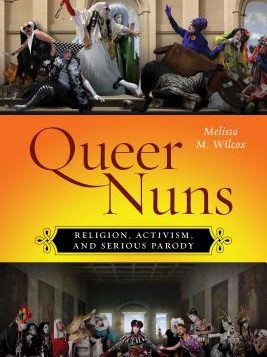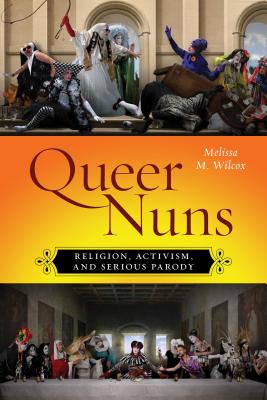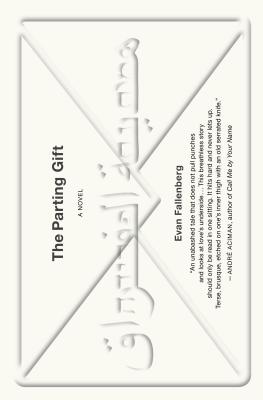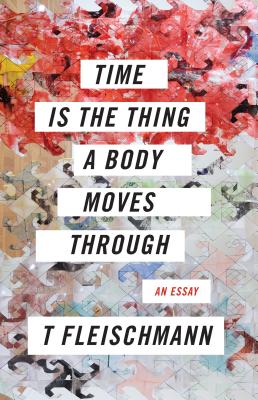“Serious parody” defines the subject matter of this serious book, produced by an academic press, featuring appendices, a bibliography, and photographs in full color. Author Melissa M. Wilcox, chair of Religious Studies at UC–Riverside, has written an ambitious analysis of the Sisters of Perpetual Indulgence, a worldwide “order” of drag queens that originated in San Francisco in the late 1970s as the gay rights movement was gaining momentum on the eve of the AIDS crisis. As of 2016, the “sisters” were active in the U.S., Canada, Uruguay, Australia, England, Scotland, Ireland, France, Germany, Switzerland, Ukraine, and the Czech Republic. Their mission, simply stated, is to promote sexual health while mocking Catholic prudery and hypocrisy—and, by extension, conservative sexual morality. According to Wilcox’s informants, “there is no international governing body of the Sisters.”
In this reviewer’s town on the Canadian prairies, the local branch is named the Bread Basket Sisters; at drag shows, they sell candles and set out a cup for donations. Among other local conditions, “sisters” must cope with different levels of homophobia. In countries such as Canada and Britain, government-run healthcare systems enable “sisters” to become integrated into existing programs. In other countries, any alignment of the “sisters” with government is likely to kill their mission. Like windblown spores, individual “sisters” who move to new locations can establish new “sisterhoods,” and these groups all share broadly-defined goals. In a time when the Church itself has been “outed” as a hotbed of sexual abuse and deflection of blame, the “sisters” who welcomed the author into their world look saintly by comparison.
Jean Roberta
Evan Fallenberg’s latest novel, The Parting Gift, is a gripping story of passionate love and its twin sibling jealousy. It begins when an unnamed narrator decides to write a letter to Adam, his college friend, who happens to be sitting across the room from him. The unnamed narrator (“He”) has been living with Adam and his girlfriend Beth since returning from Tel Aviv some four months earlier. He then begins to write the tale that led up to his arrival, a story of “a man with a record in the crimes of love.” After leaving grad school under dubious circumstances, He travels to Israel and meets up with friends. One afternoon, the group travels to a small town north of Tel Aviv to visit a popular herbal shop. It is here that He meets Uzi, a spice merchant, whose bodily smell “was meaty, truly pungent and ripe. I was drawing it in through my nostrils … letting it shoot straight into my limbic system … where memory and emotion and lust and smell get entangled.” You get the idea. He abandons his friends and the two men begin a passionate, lustful, and uncontrollable relationship.
Fallenberg has created a main character who’s likeable at first but slowly succumbs to jealousy and revenge. Yet somehow we understand how something like this could happen and empathize with his position. So, feelings of revenge: but will they be carried out? This story is nicely constructed with twists and turns throughout. Tautly written with sharply drawn characters, The Parting Gift is erotic, magnetic, and fast-paced.
William Burton
“I always know there’s going to be some bullshit at the airport,” comments the author at one point in this essay about the journey toward selfhood by a trans writer. The book is part memoir, part meditation, and part riff on the work of AIDS artist and activist Felix Gonzalez-Torres. Some of Gonzalez-Torres’ most famous pieces were “portraits” composed of piles of candy. As viewers took a piece, ate it, and threw away the wrapper, the pile was dispersed, signifying death, the dispersal of AIDS, etc. Fleischmann’s work seeks not only to examine interactions with other lovers and friends over time but also to get at the notion of how a sense of self is strung together. Writing of personal struggles with gender and identity, Fleischmann states: “It was impossible to see myself, not because of what I was looking at, but rather because I couldn’t get beyond what everyone else was looking at.” This book and that of trans writer Ari Banias, titled Anybody: Poems (2016), are the two best explorations of identity and selfhood that I’ve seen. It is by turns blunt, confrontational, eloquent, exciting, original, and somewhat indescribable. As the author says in a comic aside: “What I’m really writing is a love letter to prose, a book that is slutty about it.”
Dale Boyer
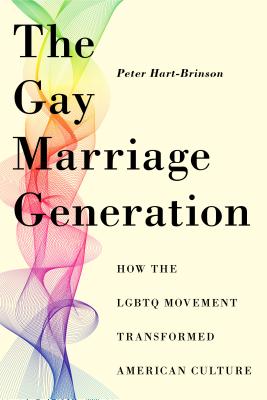 The Gay Marriage Generation: How the LGBTQ
The Gay Marriage Generation: How the LGBTQ
Movement Transformed American Culture
by Peter Hart-Brinson
NYU Press. 300 pages, $30.
A scholar with a lively curiosity, sociologist Peter Hart-Brinson has produced a rich amalgam of interviews about same-sex marriage with two generations of Americans as a way to explain the shift in public opinion in favor of marriage equality. The book provides an interesting glimpse into his 95 interview subjects’ lives, attitudes, and milieux. He also offers tables, charts, and graphs to reveal changes in public opinion over the decades. Through his in-depth interviews with older and younger subjects, he’s able to show how younger Americans have gained a greater sense of empathy for the position of LGBT people through exposure to gay people in the media and in real life. The shift from a focus on sexual behavior to identity politics allowed people to think about what it would be like to be a gay or transgender person, which facilitated more tolerant attitudes. Hart-Brinson also found that many people who opposed same-sex marriage did so without much conviction and were eventually persuaded to accept it. That said, he also explores why some people continue to believe that marriage equality is wrong, and he considers ways to counter these beliefs.
Sarah Sarai
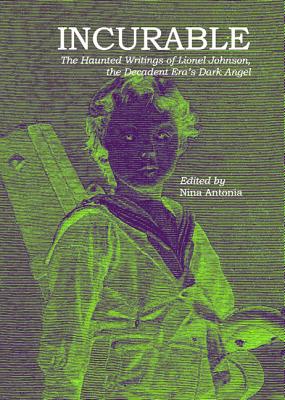 Incurable: The Haunted Writings of Lionel
Incurable: The Haunted Writings of Lionel
Johnson, the Decadent Era’s Dark Angel
Edited by Nina Antonia
Strange Attractor. 207 pages. $19.95
The first 75 pages of this book are an illustrated biography of Lionel Johnson and selected writings. Johnson was a friend of Aubrey Beardsley and W. B. Yeats and was a schoolmate of Lord Alfred Douglas. He introduced his love interest Douglas to Oscar Wilde and regretted doing so, as Wilde, to whom Johnson was also attracted, quickly absorbed Douglas. The biography is masterful, gorgeously written and packed with carefully researched gossip.
Johnson was a fey, elfin creature, so delicate in appearance that he was often mistaken for a teenager. His writing conjured worlds of the imagination, prompting Yeats to write that “he has renounced the world and built up a twilight world instead, where all the colours are like the colours in the rainbow that is cast by the Moon.” He took advantage of his unique appearance by playing female characters in Shakespeare and was a great admirer of Whitman. However, his sexual habits were, if not as cloaked in leafy subtlety as those of A. E. Housman, quite discreet compared to those of some friends.
The rest of the book features Johnson’s poems, which are often quite moving in a fatalistic way. “A Dream of Youth,” dedicated to Douglas, includes these lines: “Ah! How the fire of youth is fair,/ Yet may not be forever young!/ But night hath yielded, there hath sprung/ Morning upon the throne of night:/ Day comes, with solemnizing light:/ Consuming sorrows take to flight.” Johnson’s absinthe-fueled sorrows fled early; he died at 35, leaving a legacy of wondrous images that more ordinary eyes could not have conjured.
Alan Contreras

